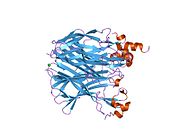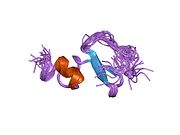Transmembrane activator and CAML interactor: Difference between revisions
No edit summary |
No edit summary |
||
| Line 2: | Line 2: | ||
{{PBB|geneid=23495}} |
{{PBB|geneid=23495}} |
||
'''Tumor necrosis factor receptor superfamily member 13B''', also known as '''TNFRSF13B''' or more commonly as '''TACI (transmembrane activator and CAML interactor''', is a transmembrane receptor protein found predominantly on the surface of [[B cells]], which are an important part of the immune system.<ref name="entrez">{{cite web | title = Entrez Gene: TNFRSF13B tumor necrosis factor receptor superfamily, member 13B| url = http://www.ncbi.nlm.nih.gov/sites/entrez?Db=gene&Cmd=ShowDetailView&TermToSearch=23495| accessdate = }}</ref> |
'''Tumor necrosis factor receptor superfamily member 13B''', also known as '''TNFRSF13B''' or more commonly as '''TACI (transmembrane activator and CAML interactor)''', is a transmembrane receptor protein found predominantly on the surface of [[B cells]], which are an important part of the immune system.<ref name="entrez">{{cite web | title = Entrez Gene: TNFRSF13B tumor necrosis factor receptor superfamily, member 13B| url = http://www.ncbi.nlm.nih.gov/sites/entrez?Db=gene&Cmd=ShowDetailView&TermToSearch=23495| accessdate = }}</ref> |
||
<!-- The PBB_Summary template is automatically maintained by Protein Box Bot. See Template:PBB_Controls to Stop updates. --> |
<!-- The PBB_Summary template is automatically maintained by Protein Box Bot. See Template:PBB_Controls to Stop updates. --> |
||
Revision as of 21:54, 4 November 2013
Template:PBB Tumor necrosis factor receptor superfamily member 13B, also known as TNFRSF13B or more commonly as TACI (transmembrane activator and CAML interactor), is a transmembrane receptor protein found predominantly on the surface of B cells, which are an important part of the immune system.[1]
Functions of TACI
TACI controls T cell-independent B cell antibody responses, isotype switching, and B cell homeostasis.
Medical significance
TACI mutations are associated with immunodeficiency in humans, as a significant proportion of CVID patients have TACI mutations. People with this condition produce abnormally low amounts of antibodies, which are needed for protection against infections.
In humans, the gene encoding this protein is located within the Smith-Magenis syndrome region on chromosome 17.[1]
Interactions
TNFRSF13B has been shown to interact with B-cell activating factor,[2][3] TRAF6,[3] TRAF5,[3] TNFSF13,[2] TRAF2[3] and CAMLG.[3][4]
References
- ^ a b "Entrez Gene: TNFRSF13B tumor necrosis factor receptor superfamily, member 13B".
- ^ a b Wu, Y (2000). "Tumor necrosis factor (TNF) receptor superfamily member TACI is a high affinity receptor for TNF family members APRIL and BLyS". J. Biol. Chem. 275 (45). UNITED STATES: 35478–85. doi:10.1074/jbc.M005224200. ISSN 0021-9258. PMID 10956646.
{{cite journal}}: Cite has empty unknown parameters:|laydate=,|laysummary=, and|laysource=(help); Unknown parameter|coauthors=ignored (|author=suggested) (help); Unknown parameter|month=ignored (help)CS1 maint: unflagged free DOI (link) - ^ a b c d e Xia, X Z (2000). "TACI is a TRAF-interacting receptor for TALL-1, a tumor necrosis factor family member involved in B cell regulation". J. Exp. Med. 192 (1). UNITED STATES: 137–43. doi:10.1084/jem.192.1.137. ISSN 0022-1007. PMC 1887716. PMID 10880535.
{{cite journal}}: Cite has empty unknown parameters:|laydate=,|laysummary=, and|laysource=(help); Unknown parameter|coauthors=ignored (|author=suggested) (help); Unknown parameter|month=ignored (help) - ^ von Bülow, G U (1997). "NF-AT activation induced by a CAML-interacting member of the tumor necrosis factor receptor superfamily". Science. 278 (5335). UNITED STATES: 138–41. doi:10.1126/science.278.5335.138. ISSN 0036-8075. PMID 9311921.
{{cite journal}}: Cite has empty unknown parameters:|laydate=,|laysummary=, and|laysource=(help); Unknown parameter|coauthors=ignored (|author=suggested) (help); Unknown parameter|month=ignored (help)
Further reading
This article incorporates text from the United States National Library of Medicine, which is in the public domain.


